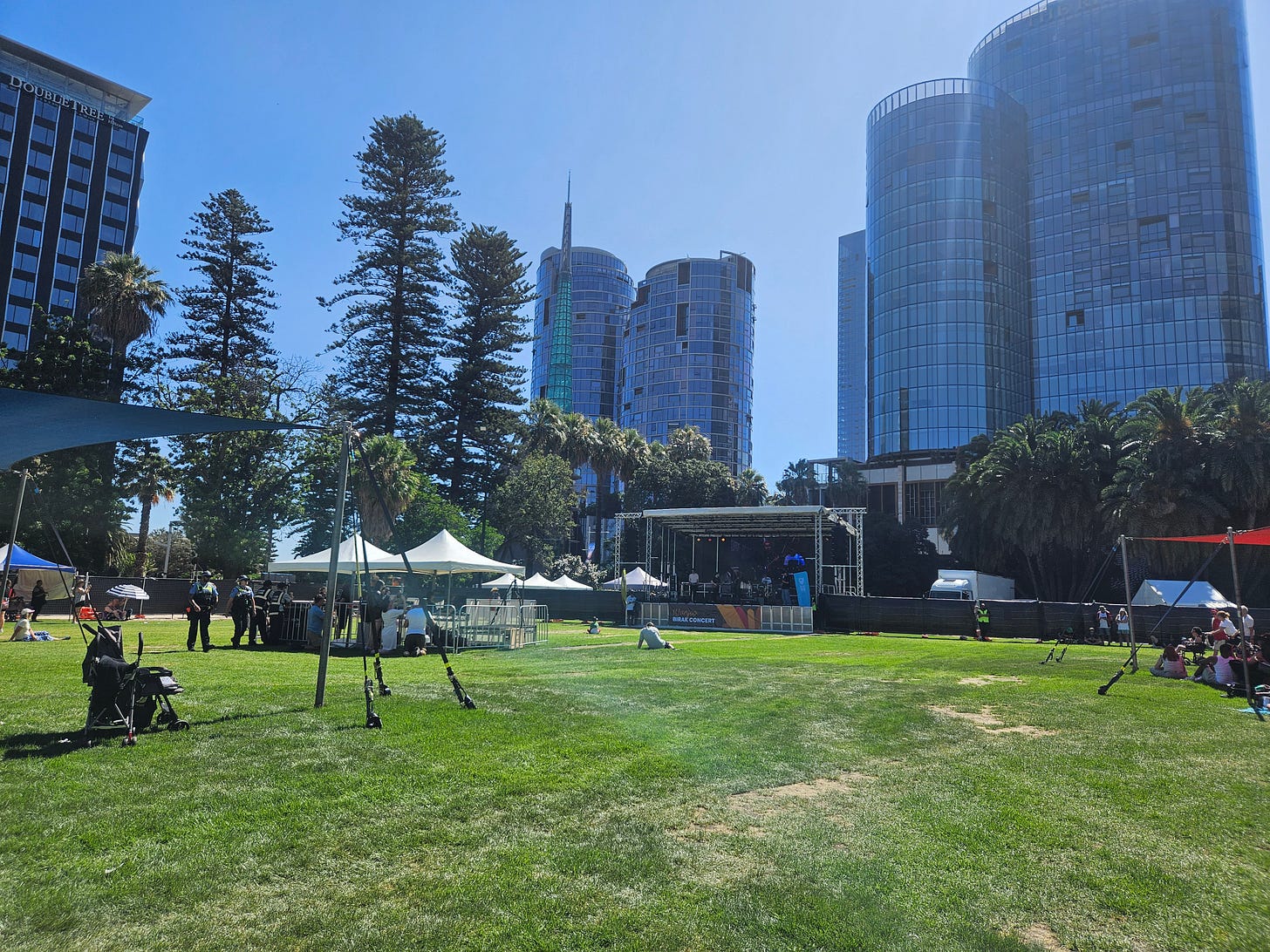Should I Stay - Or, Should I Go?
A Lesson in Fear, Travel, and Perspective
We often associate travel with discovery — of places, people, and sometimes, of ourselves. And sometimes, a simple question like “Should I stay, or should I go?” — yes, the one made famous by The Clash in 1982 — becomes more than just a lyric. It becomes a moment of reckoning, especially when fear and curiosity collide.
This past January, I found myself in Perth, Western Australia, as part of a retirement gift to myself: ten weeks of travel, exploration, and new experiences. I had no rigid itinerary, just a desire to embrace each place as it came.
While planning my time in Perth, I realized I would be there for Australia Day — a national holiday commemorating the arrival of the First Fleet in 1788. What better way to immerse myself in the country’s culture than to be part of a national celebration?
I did a bit of research and learned there were two major events planned for the day. One was in the Central Business District (CBD) near the harbour, and the other, a larger gathering with fireworks, about two kilometers away in a park along the river. Since I was staying in the CBD and didn’t have a car, I chose the closer option.
That afternoon, I packed a small backpack with a water bottle and headed to the venue. Security was light, and the atmosphere at first was relaxed: food trucks, artisan booths, carnival rides for children, and a stage set up for live music later in the day. In the center, picnic tables were scattered, with a few larger tents marked “Elders Only.” I didn’t think much of that at first.
But as the afternoon wore on, the crowd began to grow and shift.
At first, I noticed two police officers walking the grounds. Then six. Within an hour, there were more than a dozen. That in itself wasn’t alarming — large public gatherings often require a police presence — but something felt different.
I began to notice the makeup of the crowd: a significant number of Indigenous Australians, many of them older, alongside younger non-Indigenous attendees. Some carried folded signs. There was no obvious tension, but there was an energy building that felt… complicated.
It dawned on me that I might be witnessing something more than just a typical national celebration.
The question started to creep in: Should I stay? Or should I go?
Still, I stayed. I wanted to see the music, to hear the speakers. I was curious. I was also trying not to let my assumptions get the better of me.
When the event officially began, a speaker took the stage and welcomed everyone. But this wasn’t a generic welcome. It was a deeply emotional, powerful message about truth and reconciliation, about the legacy of colonization, and about what Australia Day means from the perspective of Indigenous communities.
As they spoke, the crowd shifted and non-indigenous people began moving closer to the stage.
That’s when the pieces began to click into place.
This wasn’t just a cultural celebration — it had also become a space for anti–Australia Day protestors to voice concerns. I later learned the event carried a history of tension, partly due to perceptions that Indigenous recognition could shift public funding away from other priorities, fueling ongoing debate and division.
With that context, the heightened police presence — which at first felt excessive — suddenly made sense.
As the speaker continued, I started to feel a tightening in my chest. Not because of anything happening in the moment, but because of the unknown. The what ifs. I didn’t know if this event would remain peaceful, and having just arrived in Australia at the very beginning of a long, long-awaited trip, I felt vulnerable.
And so, I left.
Outside the gates, I paused. Had I let fear win? Should I have stayed and allowed myself to experience the full truth of that day — even if it made me uncomfortable?
I still don’t have a clear answer.
On one hand, I regret not staying longer, not allowing myself to fully listen to the indigenous voices, the music, and their perspective. On the other, I recognize the balance between curiosity and self-preservation. I was alone, far from home, and just beginning a journey I’d waited years to take. Getting caught in a potential incident could have put everything at risk — including my visa status.
Travel, after all, is not just about seeking new experiences. It’s also about navigating our instincts, questioning our assumptions, and being honest with ourselves about our limits.
In that moment, I chose to go. But I carried the experience with me through the rest of my trip — not as a missed opportunity, but as a complex one. One that reminded me how layered celebration can be. How history doesn’t sit neatly in one corner or another. And how being a guest in another country means listening, even when we feel uncertain or afraid.
So the next time I hear The Clash belt out “Should I stay or should I go?”, I’ll think of a hot January day in Perth — and the quiet, complicated power of that question.


